研究性学习设计方案英语示例
英语研究性学习的研究计划
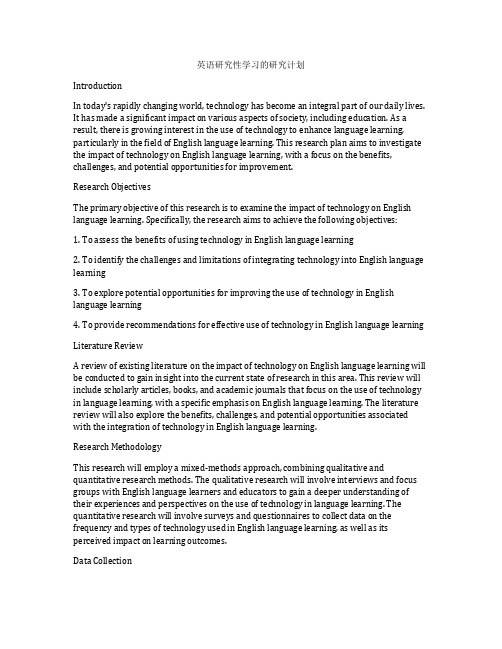
英语研究性学习的研究计划IntroductionIn today's rapidly changing world, technology has become an integral part of our daily lives. It has made a significant impact on various aspects of society, including education. As a result, there is growing interest in the use of technology to enhance language learning, particularly in the field of English language learning. This research plan aims to investigate the impact of technology on English language learning, with a focus on the benefits, challenges, and potential opportunities for improvement.Research ObjectivesThe primary objective of this research is to examine the impact of technology on English language learning. Specifically, the research aims to achieve the following objectives:1. To assess the benefits of using technology in English language learning2. To identify the challenges and limitations of integrating technology into English language learning3. To explore potential opportunities for improving the use of technology in English language learning4. To provide recommendations for effective use of technology in English language learning Literature ReviewA review of existing literature on the impact of technology on English language learning will be conducted to gain insight into the current state of research in this area. This review will include scholarly articles, books, and academic journals that focus on the use of technology in language learning, with a specific emphasis on English language learning. The literature review will also explore the benefits, challenges, and potential opportunities associated with the integration of technology in English language learning.Research MethodologyThis research will employ a mixed-methods approach, combining qualitative and quantitative research methods. The qualitative research will involve interviews and focus groups with English language learners and educators to gain a deeper understanding of their experiences and perspectives on the use of technology in language learning. The quantitative research will involve surveys and questionnaires to collect data on the frequency and types of technology used in English language learning, as well as its perceived impact on learning outcomes.Data CollectionData collection will involve gathering information from a variety of sources, including English language learners, educators, and relevant literature. Surveys and questionnaires will be distributed to English language learners and educators to collect quantitative data on the use of technology in language learning. Interviews and focus groups will be conducted to gather qualitative data on the experiences and perspectives of English language learners and educators regarding the use of technology in language learning.Data AnalysisThe collected data will be analyzed using appropriate statistical and qualitative analysis methods. Quantitative data from surveys and questionnaires will be analyzed using statistical software to identify patterns and trends in the use of technology in English language learning. Qualitative data from interviews and focus groups will be analyzed using thematic analysis to identify recurring themes and patterns in the experiences and perspectives of English language learners and educators.Ethical ConsiderationsThe research will adhere to ethical guidelines and ensure the protection of human subjects. Informed consent will be obtained from all participants, and their privacy and confidentiality will be maintained throughout the research process. Any potential risks or discomfort to participants will be minimized, and their participation will be voluntary. Expected OutcomesThe expected outcomes of this research include a better understanding of the impact of technology on English language learning, as well as insights into the benefits, challenges, and potential opportunities for improvement. The research findings will contribute to the existing body of knowledge on the use of technology in language learning and provide valuable insights for educators, researchers, and policymakers.ConclusionIn conclusion, this research plan aims to investigate the impact of technology on English language learning, with a focus on the benefits, challenges, and potential opportunities for improvement. By employing a mixed-methods approach and gathering data from a variety of sources, this research seeks to provide a comprehensive understanding of the role of technology in language learning and contribute to the ongoing efforts to improve English language learning through the effective use of technology.。
英语学习的研究性学习方案
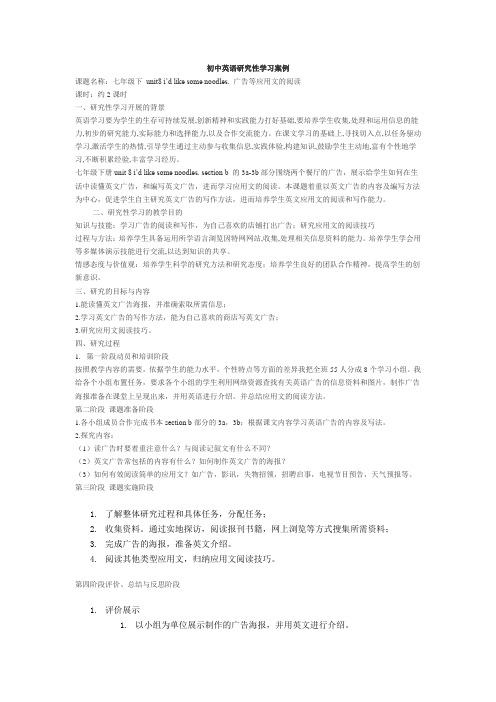
初中英语研究性学习案例课题名称:七年级下unit8 i’d like some noodles. 广告等应用文的阅读课时:约2课时一、研究性学习开展的背景英语学习要为学生的生存可持续发展,创新精神和实践能力打好基础,要培养学生收集,处理和运用信息的能力,初步的研究能力,实际能力和选择能力,以及合作交流能力。
在课文学习的基础上,寻找切入点,以任务驱动学习,激活学生的热情,引导学生通过主动参与收集信息,实践体验,构建知识,鼓励学生主动地,富有个性地学习,不断积累经验,丰富学习经历。
七年级下册unit 8 i’d like some noodles. section b 的3a-3b部分围绕两个餐厅的广告,展示给学生如何在生活中读懂英文广告,和编写英文广告,进而学习应用文的阅读。
本课题着重以英文广告的内容及编写方法为中心,促进学生自主研究英文广告的写作方法,进而培养学生英文应用文的阅读和写作能力。
二、研究性学习的教学目的知识与技能:学习广告的阅读和写作,为自己喜欢的店铺打出广告;研究应用文的阅读技巧过程与方法:培养学生具备运用所学语言浏览因特网网站,收集,处理相关信息资料的能力。
培养学生学会用等多媒体演示技能进行交流,以达到知识的共享。
情感态度与价值观:培养学生科学的研究方法和研究态度;培养学生良好的团队合作精神,提高学生的创新意识。
三、研究的目标与内容1.能读懂英文广告海报,并准确索取所需信息;2.学习英文广告的写作方法,能为自己喜欢的商店写英文广告;3.研究应用文阅读技巧。
四、研究过程1. 第一阶段动员和培训阶段按照教学内容的需要,依据学生的能力水平,个性特点等方面的差异我把全班55人分成8个学习小组。
我给各个小组布置任务,要求各个小组的学生利用网络资源查找有关英语广告的信息资料和图片,制作广告海报准备在课堂上呈现出来,并用英语进行介绍。
并总结应用文的阅读方法。
第二阶段课题准备阶段1.各小组成员合作完成书本section b部分的3a,3b;根据课文内容学习英语广告的内容及写法。
Be Helpful研究性学习设计方案
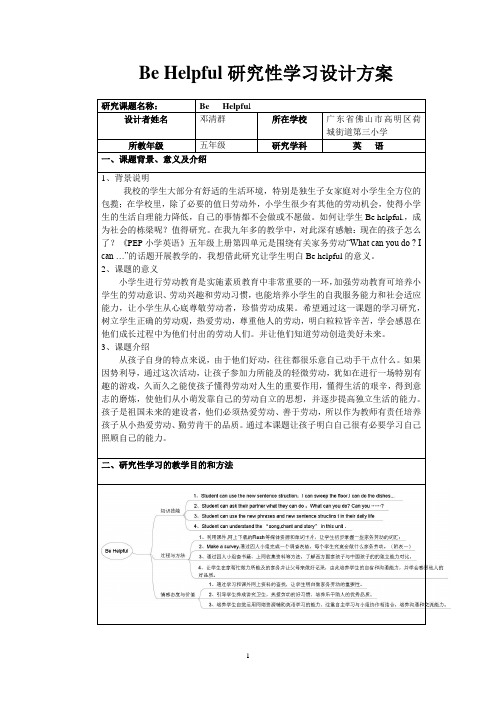
Be Helpful研究性学习设计方案附表1学生做家务问卷调查表⒈你认为主动做家务是理所当然的吗?(请按你的真实想法选择哦)…… ( )A.这是自然B.并不这样觉得C.那要看心情⒉你认为做家务对小学生的全面发展有帮助吗?……………………………()A.有很大的帮助B.百害而无一利C.帮助不大,但也起到一定的作用⒊你记得最近一次做家务是什么时候?………………………………………()A.一天左右B.一星期左右C.一个月左右D.更久..⒋通常是在什么情况下去做家务的?…………………………………………( )A. 父母长辈要求去做B.自愿去做的C.当做家务可以得到某种程度的回报时⒌你多久进行一次家务劳动?………………………………………………()A.几乎每天B.一星期左右C. 一两个月左右D.半年或更久⒍你的房间一般由谁整理?………………………………………………… ()A.妈妈或其他人B.自己⒎家里的客厅一般由谁打扫?………………………………………………()A.父母或其他人B.你主动打扫的C.父母要求你整理⒏关于家务劳动对中学生身心全面发展的影响你有什么看法?附表2活动研究计划表附表3:学生在家情况家长问卷调查表年级班级年龄性别家长职业1.你们的子女回家能主动帮助家长做一些力所能及的家务吗?()A.能B.有时帮着做一些C.基本不做D.我们不要子女做2.你们认为学生在家做家务劳动是否会影响学习?()A.不会影响B.有一些影响C.会影响3.你们对学校组织学生参加各种公益劳动是否支持?()A.支持B.不支持4.你们的孩子有没有独自打扫过家中的卫生?()A.经常B.偶尔C.从来没有D.不需要孩子这样做5.当你们有事外出时,您们的子女是否能自己解决做饭问题?()A.能自己解决B.要帮他C.安排好D.还没有考虑6.当你们的子女得了感冒或其它小毛病时,能否自己到医院或社区卫室看病配药?()A.能自己去B.偶尔自己去看过病C.从来没有7.当你们不在家时,你的子女是否能热情的接待熟悉的客人?()A.能做到,而且招待得很好B.把客人请进了家,就不管了C.把客人拒之门外,说“家里没人”8.你们对培养学生的劳动习惯有何建议和意见?__________________________________________________________ ___________________________________________________________附表4学生家务劳动调查问卷姓名年月日附表5:学生家务劳动记录表。
最新英语5研究性学习设计

3.同时可以让学生运用网络归纳总结出在购物过程中更多的shopping与bargaining的表达方式,并在组内分享。
3、两女同学结伴看了一个又一个海报,商量着买什么商品:I like this kind of dress, let us have a try.
4、卖毛衣的一同学终于迎来了一桩生意,却遇到了“抠门”的顾客。他们的对话很精彩。
本节课,我们主要学习了如何用英语进行购物和讨价还价,同学们整个学习过程以及投入活动的积极性值得表扬。
5.通过表扬小结和评价,鼓励学生继续努力,同时增强他们学习英语的自信心,使其在课堂上、生活中更大胆地用英语表达自己。
【过程】(过程要体现研究性学习的主要环节)
活动1.教师拿出事先准备好的可口可乐的海报并提问:
Suppose you are in a supermarket and find there is a big sale.
2、课堂交给学生,时间由学生自由支配,不拘形式。让学生在成为课堂主人的同时,将所学知识发挥得淋漓尽致。任务驱动式的学习充分发挥了学生的主观能动性,学习活动由学生自主完成,改变了以往依赖老师、被动接受的学习方式。学生在单元主题学习活动的课堂上获得了相当的“自由”,既发挥学生的主动性,创新精神和学习热情得到了较好的激发。在学生自主地完成探究过程中,学生的主体精神得到了培养和锻炼。
Suppose you are in a supermarket and find there is a big sale.
英语研究性学习活动方案

英语研究性学习活动方案Let's dive into some exciting ideas for our English study activities!First up, how about a movie night? We can watch an English movie, maybe a classic like "The Shawshank Redemption" or a more recent hit. After the movie, we can discuss the plot, characters, and language used. This will help us understand real-life English usage in a fun and engaging way.Another great idea is a role-playing game. We can set up a scenario, like a restaurant or a business meeting, and each person can take on a role. We'll have to use our English skills to communicate with each other and solve problems. It'll be a blast and a great way to practice speaking!If you're into music, we can have a song lyrics analysis session. Pick a popular English song and analyzethe lyrics. We can discuss the meaning, vocabulary, and grammar used. This will not only improve our language skills but also help us appreciate music in a new way.For the bookworms among us, a book club would be perfect. We can choose an English novel to read together and meet weekly to discuss chapters, characters, themes, and more. This will help us develop our reading comprehension and vocabulary.Lastly, let's not forget about technology. There are plenty of apps and online platforms that offer interactive English learning activities. We can try out some of these together and see which ones we like best. This will.。
英语研究性学习活动方案

英语研究性学习活动方案English Answer:Title: The Impact of Social Media on Adolescent Communication and Development.Research Objective:To investigate the multifaceted effects of social media usage on adolescents' communication patterns, interpersonal relationships, and overall cognitive and emotional development.Methodology:1. Literature Review: Comprehensive review of existing research on the topic, identifying key theoretical perspectives and empirical findings.2. Qualitative Interviews: In-depth interviews withadolescents from diverse backgrounds to explore their experiences and perceptions of social media use.3. Quantitative Survey: Large-scale survey administered to adolescents to gather data on their social media usage patterns, communication habits, and developmental outcomes.4. Longitudinal Study: Follow-up study to track changes in adolescents' social media use and its impact over time.Expected Outcomes:This study aims to provide a comprehensive understanding of the following:The frequency, patterns, and motivations for social media use among adolescents.The impact of social media on adolescents' communication skills, including verbal and nonverbal expression.The role of social media in shaping adolescents' social relationships, peer interactions, and self-esteem.The potential cognitive and emotional effects of social media use, such as its influence on attention span, empathy, and mood regulation.The findings of this study will inform policy and educational interventions aimed at promoting the responsible and beneficial use of social media by adolescents.中文回答:标题,社交媒体对青少年交流和发展的影响。
研究性学习课题研究范文
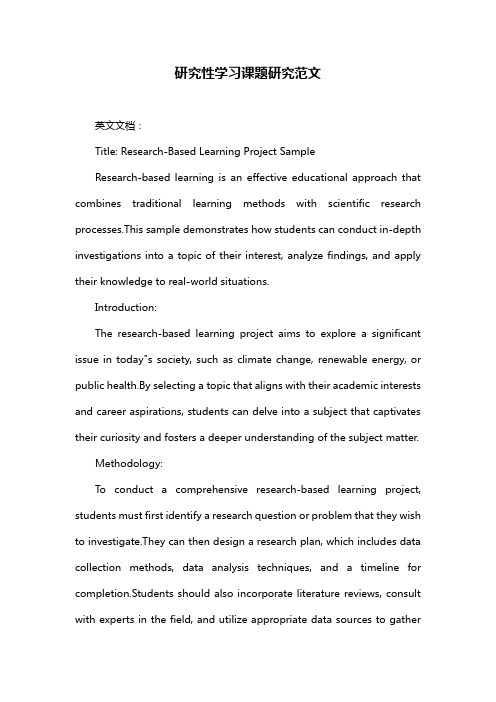
研究性学习课题研究范文英文文档:Title: Research-Based Learning Project SampleResearch-based learning is an effective educational approach that combines traditional learning methods with scientific research processes.This sample demonstrates how students can conduct in-depth investigations into a topic of their interest, analyze findings, and apply their knowledge to real-world situations.Introduction:The research-based learning project aims to explore a significant issue in today"s society, such as climate change, renewable energy, or public health.By selecting a topic that aligns with their academic interests and career aspirations, students can delve into a subject that captivates their curiosity and fosters a deeper understanding of the subject matter.Methodology:To conduct a comprehensive research-based learning project, students must first identify a research question or problem that they wish to investigate.They can then design a research plan, which includes data collection methods, data analysis techniques, and a timeline for completion.Students should also incorporate literature reviews, consult with experts in the field, and utilize appropriate data sources to gatherrelevant information.Data Collection:Once the research plan is in place, students can begin collecting data.This may involve conducting surveys, experiments, or interviews, or analyzing existing data sets.It is essential to ensure that data collection procedures adhere to ethical guidelines and that all data is accurately recorded and stored.Data Analysis:After collecting the necessary data, students must analyze the information to draw meaningful conclusions.This process may include statistical analysis, thematic analysis, or other appropriate methods depending on the nature of the data.Students should interpret their findings accurately and objectively, recognizing any limitations or biases in their research.Conclusion:Throughout the research-based learning project, students develop critical thinking, problem-solving, and communication skills.They also gain a deeper understanding of the topic and its relevance to society.By presenting their findings in a clear and concise manner, students can share their insights with peers, instructors, and the broader community, contributing to the advancement of knowledge in their field.中文文档:标题:研究性学习课题研究范例研究性学习是一种有效的教育方法,它将传统的学习方式与科学的研究过程相结合。
英语研究性学习设计方案模板

研究性学习设计方案模板(二)过程与方法:利用课堂教学及小组合作学习,让学生初步学会本单元的单词和句子,学会小组合作学习。
利用课件、电脑、电视等媒体资源,了解各个地方的文化差异,学会如何利用网络搜索资料。
通过小组查书籍,上网查资料等方法,了解如何进行日常交谈的方法。
(三)情感态度与价值观:1、通过查找资料,围绕社会文明这个话题进行讨论等活动,让学生了解中西文化的差异,了解更多有关全球文化对人类生活影响的常识,培养学生关注社会、热爱世界观文化、热爱科学的情操。
2、注重学生语言应用能力的培养,体现语言的交际功能,贯彻语言应用思想的基本原则。
树立社交文化,由我做起的意识。
有合作精神,能够与他人协作,共同完成任务。
思维导图如下:三、参与者特征分析(重点分析学生有哪些共性、有哪些差异,尤其对开展研究性学习有影响的因素。
)参与本课题研究性学习的是高中三年级学生,三年级学生对英语有了一定的熟练,对英语这门学科接触已久,学生好学,注意力集中,教师应用学生能接受的节奏组织形式多样的课堂活动,使学生在轻松愉快而又紧张刺激的氛围中学习,教学效果会大大提高。
三年级的学生经过多年的英语学习,有了一定的英语学习基础,大多数学生装瓣生了浓厚的英语学习兴趣。
在学习策略方面,经过几年的学习,学生基本都有了一定的学习方法,在分组,合作方面都训练过不少,有较好的基础。
但同时学生的水平也是参差不齐的,有些学生三年级的英语词汇学得不够好,会在研究的过程当中遇到一些语言障碍,但有些孩子不仅课本上的词汇掌握得好,课外也积累了不少词汇,这就要充分发挥小组合租的功能,互相帮助,分组时也要注意引导小组内要各方面的人才都有。
还有一个比较大的问题就是,我们的学生都是来自农村,家里很多都没有电脑,书籍也不多,加上网络搜索的能力也比较差,这都会大大影响研究学习中资料的收集和积累,教师在这方面要为他们创造条件。
在生活经历生活,三年级的学生大约十八九岁左右,情绪比较外露,已经积累了一定的生活常识,由于现代信息媒介的作用,他们对部分社交技巧有了一定的认识,对社会文化体验也比较深,这对课题的实施都是一些有利的条件。
研究性学习设计方案(英语)

第二阶段 课题准备阶段
提出和选择课题
1讨论要比较全面地了解中西方节日名称。
2经过师生共同讨论,以学生最急于了解或最感兴趣的方面,确定研究主题,比如:1)节日风俗的差异2)文化差异。3)中国人过哪些西方的节日。4)中国传统节日的特点。
照相机。
七、研究性学习的阶段设计
研究性学习的阶段
学生活动
教师活动
起止时间
第一阶段:动员和培训(初步认识研究性学习、理解研究性学习的研究方法)
所教年级
五年级
研究学科
英语
联系电话
xxxxxxx
电子邮件
xxxxxxx@
一、课题背景、意义及介绍
2. 头脑风暴
在网上就本小组的主题进行讨论,自由发言。
3. 记录总结活动
各小组及时把当天活动内容集中起来,在小组长的组织下将所有资料进行综合整理。列出活动主要内容,写出简单的活动结论。
指导教师主动向各组了解获得的信息资料。
2各成员进行自我评价,由小组长整理汇报。
3 小组汇报小组自评。
4当所有组成果汇报完毕,各小组还要对其他小组的活动成果展开评价。
5 各组长整理汇报本组的“被访者评价”以及“家长评价”。
6老师引导学生做出电子书呈现所有的研究成果。
研究性学习设计方案(英语) - 〖三民小学〗 - 〖万顷沙特色〗 - 万顷沙社区 网址之家 | 网络电台 | 淘宝网 | 免费影视 | 杂志
| 祖玛 | 搜狐微博 | 算命 | 汽车 | 支付宝 | 争车位 | 免费电影 | 百宝箱 | 520小说网 | wqs520门户 | 网络电视 |
二、研究性学习的教学目的和方法(可按新课程标准的三维目标(或布鲁姆目标分类法)进行研究性学习的教学目和方法的阐述)
探究型学习活动设计 小学英语研究性学习设计方案
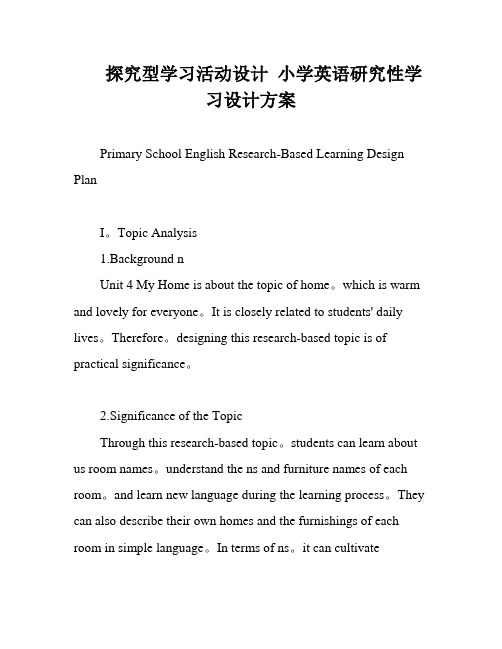
探究型学习活动设计小学英语研究性学习设计方案Primary School English Research-Based Learning Design PlanI。
Topic Analysis1.Background nUnit 4 My Home is about the topic of home。
which is warm and lovely for everyone。
It is closely related to students' daily lives。
Therefore。
designing this research-based topic is of practical significance。
2.Significance of the TopicThrough this research-based topic。
students can learn about us room names。
understand the ns and furniture names of each room。
and learn new language during the learning process。
They can also describe their own homes and the furnishings of each room in simple language。
In terms of ns。
it can cultivatestudents' love for their homes and families and enjoy the warmth of home.3.Topic nWith the development of society and the improvement of the economy。
people's requirements for housing design and home furnishings are constantly increasing。
《研究性学习设计方案模板》作业(八年级英语)
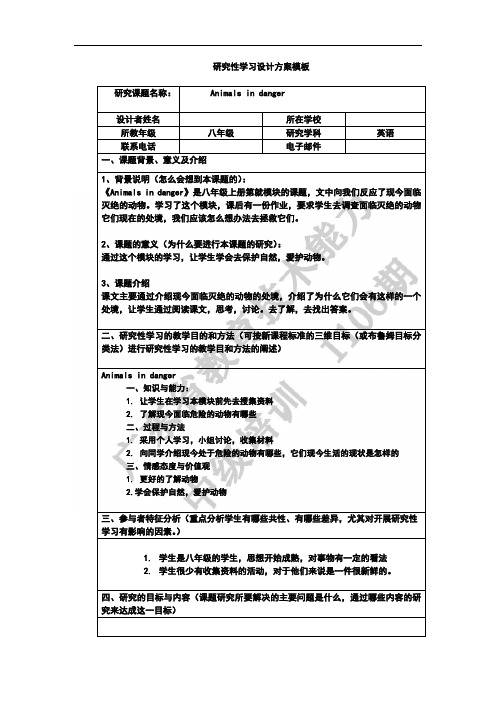
图片展览。短片展览。作文展览。
六、资源准备
教师提供的资料:图片,短片
学生准备的的资料:作文,收集的资料信息
七、研究性学习的阶段设计
研究性学习的阶段
学生活动
教师活动
起止时间
第一阶段:动员和培训(初步认识研究性学习、理解研究性学习的研究方法)
1.初步认识什么是研究性学习
2.了解研究性学习的学习方法
1.介绍研究性学习的定义
讲解活动计划,指导学生进行研究性学习方案
第三阶段:课题实施阶段
1.小组分工合作
2.小组整理资料,与其他小组进行交流
3.各小组向全班汇报信息,并对其他小组提出建议
1.教师跟进。对学生的资料进行指导和帮助
2.教师要教会学生学习方法,引导学生有序的开展活动
1周
八、总结与反思(实践后总结、反思整个研究性学习过程,提出改进意见)
1.学生是八年级的学生,思想开始成熟,对事物有一定的看法
2.学生很少有收集资料的活动,对于他们来说是一件很新鲜的。
四、研究的目标与内容(课题研究所要解决的主要问题是什么,通过哪些内容的研究来达成这一目标)
五、研究的预期成果及其表现形式(研究的最终成果以什么样的形式展现出来,是论文、实验报告、实物、网站、多媒体还是其他形式)
Animals in danger
一、知识与能力:
1.让学生在学习本模块前先去搜集资料
2.了解现今面临危险的动物有哪些
最新英语研究性学习设计
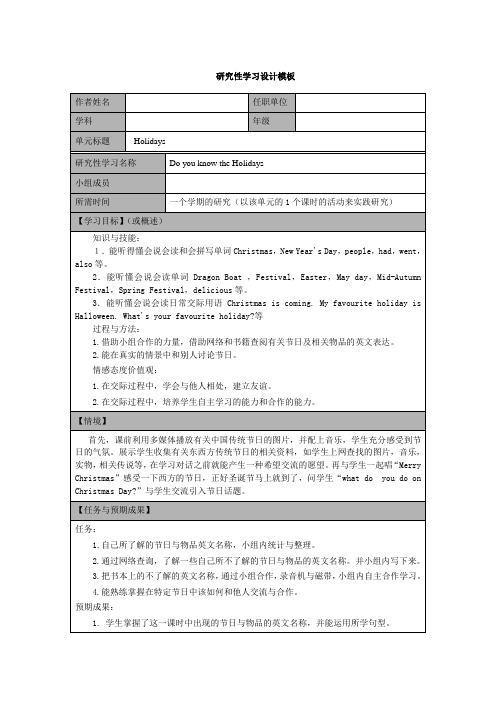
研究性学习设计模板作者姓名任职单位学科年级单元标题Holidays研究性学习名称Do you know the Holidays小组成员所需时间一个学期的研究(以该单元的1个课时的活动来实践研究)【学习目标】(或概述)知识与技能:1.能听得懂会说会读和会拼写单词Christmas,New Year's Day,people,had,went,also等。
2.能听懂会说会读单词Dragon Boat ,Festival,Easter,May day,Mid-Autumn Festival,Spring Festival,delicious等。
3.能听懂会说会读日常交际用语Christmas is coming. My favourite holiday is Halloween. What's your favourite holiday?等过程与方法:1.借助小组合作的力量,借助网络和书籍查阅有关节日及相关物品的英文表达。
2.能在真实的情景中和别人讨论节日。
情感态度价值观:1.在交际过程中,学会与他人相处,建立友谊。
2.在交际过程中,培养学生自主学习的能力和合作的能力。
【情境】首先,课前利用多媒体播放有关中国传统节日的图片,并配上音乐,学生充分感受到节日的气氛。
展示学生收集有关东西方传统节日的相关资料,如学生上网查找的图片,音乐,实物,相关传说等,在学习对话之前就能产生一种希望交流的愿望。
再与学生一起唱“Merry Christmas”感受一下西方的节日,正好圣诞节马上就到了,问学生“what do you do on Christmas Day?”与学生交流引入节日话题。
【任务与预期成果】任务:1.自己所了解的节日与物品英文名称,小组内统计与整理。
2.通过网络查询,了解一些自己所不了解的节日与物品的英文名称。
并小组内写下来。
3.把书本上的不了解的英文名称,通过小组合作,录音机与磁带,小组内自主合作学习。
英语研究性学习优秀方案
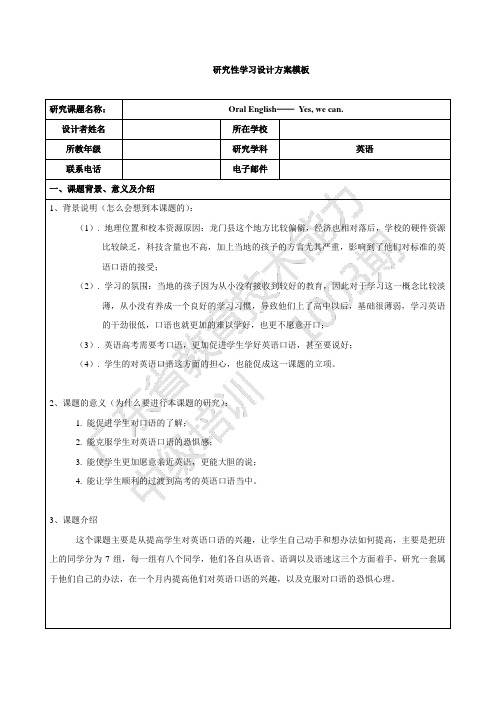
研究性学习设计方案模板研究课题名称:Oral English——Yes, we can.设计者姓名所在学校所教年级研究学科英语联系电话电子邮件一、课题背景、意义及介绍1、背景说明(怎么会想到本课题的):(1). 地理位置和校本资源原因:龙门县这个地方比较偏僻,经济也相对落后,学校的硬件资源比较缺乏,科技含量也不高,加上当地的孩子的方言尤其严重,影响到了他们对标准的英语口语的接受;(2). 学习的氛围:当地的孩子因为从小没有接收到较好的教育,因此对于学习这一概念比较淡薄,从小没有养成一个良好的学习习惯,导致他们上了高中以后,基础很薄弱,学习英语的干劲很低,口语也就更加的难以学好,也更不愿意开口;(3). 英语高考需要考口语,更加促进学生学好英语口语,甚至要说好;(4). 学生的对英语口语这方面的担心,也能促成这一课题的立项。
2、课题的意义(为什么要进行本课题的研究):1. 能促进学生对口语的了解;2. 能克服学生对英语口语的恐惧感;3. 能使学生更加愿意亲近英语,更能大胆的说;4. 能让学生顺利的过渡到高考的英语口语当中。
3、课题介绍这个课题主要是从提高学生对英语口语的兴趣,让学生自己动手和想办法如何提高,主要是把班上的同学分为7组,每一组有八个同学,他们各自从语音、语调以及语速这三个方面着手,研究一套属于他们自己的办法,在一个月内提高他们对英语口语的兴趣,以及克服对口语的恐惧心理。
二、研究性学习的教学目的和方法(可按新课程标准的三维目标(或布鲁姆目标分类法)进行研究性学习的教学目和方法的阐述)1. 知识与技能:⑴能更好的学习到标准的英语语音、语调,以及更好的提高语速;⑵能在学习口语的过程当中学到外国的地道的风俗;⑶能在学习和口语的过程当中逐渐提高阅读能力和写作能力;⑷能在学习口语的过程当中形成一种良好的语感。
2.过程与方法:(1)通过向老师咨询,网上查询等方法收集有关口语的素材;(2)积极运用所学英语进行学生间的交流,加强合作式学习,进一步规范英语口语的发音;(3)通过学习成果展示,锻炼学生语言表达和评价能力;(4)把语言材料中的词汇与语言的地道的运用,提高他们的表达能力。
英语研究性学习方案样例

研究性学习设计方案模板
1、通过视、听。
说,玩、唱、画、游、读、写、译等饶有趣味的活动及开展两人小组、多人小组、成行、成排、半班等多种形式的活动,使每一个学生充分地参与课堂实践,体现出语言的交际性
2、经历发现问题、分析问题、解决问题的研究过程,初步学会探究学习的方法,能写出调查报告。
3、经历小组合作学习,实地调查,初步学会如何与人交际、与人协作。
情感态度与价值观:
1、能激发学生学习英语的兴趣培养他们英语学习的积极态度,使他们健立初步的学习英语的自信心。
2、积极主动地学习英语,变厌学为乐学
3、能积极主动地与教师,同学甚至外国人进行交流,培养热爱学习英语的情感。
三、参与者特征分析(重点分析学生有哪些共性、有哪些差异,尤其对开展研究性学习有影响的因素。
)
智力因素方面:知识基础、认知能力、认知结构变量。
非智力因素:动机水平、归因类型、焦虑水平、学习风格。
1、学生是初中三年级别的学生;
2、学生已经有1000到1300字的英语写作能力;
3、学生的英语基础知识一般;
4、学生对问卷调查、采访等活动非常熟悉;
5、学生思维活跃,乐于表达自己,渴望达到同学和教师的赞许;
6、学生对研究问题有着浓厚的兴趣。
7、学生对英语学习不够重视,对英语的表达上还有一定的障碍。
8、相当一部分学生对学习英语有一定厌学情绪。
四、研究的目标与内容(课题研究所要解决的主要问题是什么,通过哪些内容的研究来达成这一目标)
课题研究所要解决的主要问题是什么,通过哪些内容的研究来达成这一目标,学生可能的选题内容是什么:
课题研究所要解决的主要问题:。
研究性学习设计方案英语

Research-Based Learning Design Proposal1. IntroductionResearch-based learning (RBL) is an instructional approach that encourages students to actively engage in the process of inquiry and discovery. The aim of this proposal is to outline a design plan for implementing research-based learning in English language classrooms. By incorporating research activities into the curriculum, students are given the opportunity to develop critical thinking skills, enhance their language proficiency, and foster a deeper understanding of the subject matter.2. ObjectivesThe objectives of this research-based learning design plan are as follows:- To promote student engagement and motivation in the learning process.- To encourage independent thinking and problem-solving abilities.- To develop research skills, including information retrieval and analysis.- To enhance language proficiency through authentic communication and writing tasks.- To foster a deeper understanding of English language and culture through inquiry-based learning.3. Methodology3.1 Selection of TopicsThe first step in designing a research-based learning curriculum is to carefully select appropriate topics. These topics should be aligned with the language proficiency level of the students and relevant to their interests and experiences. By choosing engaging and meaningful topics, students are more likely to be motivated and actively participate in the research process.3.2 Research Skills TrainingPrior to initiating research projects, students should be provided with training on research skills. This training should include guidance on conducting literature reviews, formulating research questions, collecting and analyzing data, and presenting findings. Students should be familiarized with different research methodologies, such as interviews, surveys, and experiments, to ensure they have a wide range of tools at their disposal.3.3 Task DesignResearch-based learning tasks should be designed to be authentic and meaningful. Students should be given opportunities to explore real-world problems and analyze them from multiple perspectives. The tasks should require students to critically evaluate information, synthesize findings, and present their conclusions in a clear and coherent manner. This can be achieved through a variety of tasks, such as research papers, oral presentations, debates, and group projects.3.4 Collaboration and FeedbackCollaboration and peer feedback play a vital role in research-based learning. Students should be encouraged to work collaboratively in groups, allowing them to benefit from different perspectives and share the workload. Peer feedback should be incorporated at various stages of the research process, enabling students to improve their work based on constructive criticism.4. AssessmentResearch-based learning can be assessed through a combination of formative and summative assessments. Formative assessments, such as regular progress checks and reflections, provide students with ongoing feedback and opportunities for improvement. Summative assessments, suchas research papers or presentations, evaluate students' overall performance and understanding of the topic. It is important to assess both the process and the product of the research, focusing on research skills, critical thinking, language proficiency, and the ability to communicate effectively.5. ConclusionThe implementation of research-based learning in English language classrooms can greatly benefit students by fostering critical thinking skills, enhancing language proficiency, and promoting a deeper understanding of the subject matter. Through carefully designed research tasks and appropriate assessment measures, students can engage in authentic and meaningful learning experiences. By providing students with the opportunity to explore their interests, analyze real-world problems, and actively participate in the learning process, research-based learning can contribute to the overall development of students' academic and professional skills in the field of English language studies.。
英文研学活动策划方案模板
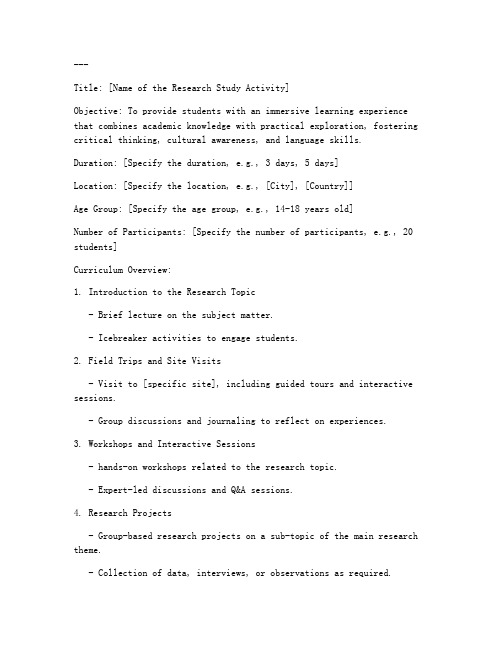
---Title: [Name of the Research Study Activity]Objective: To provide students with an immersive learning experience that combines academic knowledge with practical exploration, fostering critical thinking, cultural awareness, and language skills.Duration: [Specify the duration, e.g., 3 days, 5 days]Location: [Specify the location, e.g., [City], [Country]]Age Group: [Specify the age group, e.g., 14-18 years old]Number of Participants: [Specify the number of participants, e.g., 20 students]Curriculum Overview:1. Introduction to the Research Topic- Brief lecture on the subject matter.- Icebreaker activities to engage students.2. Field Trips and Site Visits- Visit to [specific site], including guided tours and interactive sessions.- Group discussions and journaling to reflect on experiences.3. Workshops and Interactive Sessions- hands-on workshops related to the research topic.- Expert-led discussions and Q&A sessions.4. Research Projects- Group-based research projects on a sub-topic of the main research theme.- Collection of data, interviews, or observations as required.5. Cultural Exchange Activities- Cultural exchange events with local communities or students from other schools.- Language exchange activities to improve conversational skills.6. Final Presentation and Reflection- Group presentations of research findings.- Reflection sessions to discuss the learning outcomes and personal growth.Activity Schedule:Day 1: Arrival and Introduction- Morning: Welcome ceremony and introduction to the program.- Afternoon: Icebreaker activities and first lecture on the research topic.Day 2: Field Trip and Workshops- Morning: Visit to [specific site] with guided tour.- Afternoon: First workshop on [specific skill or topic].Day 3: Research Projects and Cultural Exchange- Morning: Group research project planning and data collection.- Afternoon: Cultural exchange activities and language exchange session.Day 4: Workshops and Field Research- Morning: Second workshop on [specific skill or topic].- Afternoon: Continued field research and data collection.Day 5: Final Presentations and Reflection- Morning: Final preparation for group presentations.- Afternoon: Group presentations, reflection sessions, and closing ceremony.Facilitators and Resources:- Lead Facilitator: [Name], [Title], [Institution]- Assistant Facilitators: [List of names and titles]- Materials and Resources: [List of materials needed, e.g., research guides, data collection tools, presentation software]Budget:- Travel and Accommodation: [Details of travel and accommodation costs]- Food and Supplies: [Details of food and supply costs]- Facilitator Fees: [Details of facilitator fees]- Miscellaneous: [Other expenses]Health and Safety:- First Aid Kit: [Ensure availability of a first aid kit]- Emergency Contact Information: [Provide emergency contact information]- Health and Safety Protocols: [Outline health and safety protocols]Assessment:- Research Projects: Graded based on the quality of research, data collection, and analysis.- Group Presentations: Graded based on content, delivery, and participation.- Reflection Journals: Graded based on depth of reflection and personal insights.Follow-Up:- Post-Activity Survey: Conduct a survey to gather feedback on the program.- Share Research Findings: Encourage students to share their research findings with their peers and families.- Future Programs: Plan for future research study activities based on the success of this program.---This template provides a comprehensive structure for planning an English research study activity. Adjustments can be made to fit specific requirements, locations, and themes.。
- 1、下载文档前请自行甄别文档内容的完整性,平台不提供额外的编辑、内容补充、找答案等附加服务。
- 2、"仅部分预览"的文档,不可在线预览部分如存在完整性等问题,可反馈申请退款(可完整预览的文档不适用该条件!)。
- 3、如文档侵犯您的权益,请联系客服反馈,我们会尽快为您处理(人工客服工作时间:9:00-18:30)。
研究性学习设计方案模板
研究课题名称:XXXX
设计者姓名XXX 所在学校XXX
所教年级XXX 研究学科英语
联系电话XXXX 电子邮件XXXX
一、课题背景、意义及介绍
1、背景说明(怎么会想到本课题的):
Our clothes是近期我校英语课题组准备在结题验收中上的一节汇报课,也是八年级英语第八单元的重点知识,更是中考英语口语考试中常有的热门考点之一。
以此作为研究课题具有一定的实用性和操作性,希望对我校英语课题组的研究能够有帮助,对八年级学生的英语课程学习有促进作用。
2、课题的意义(为什么要进行本课题的研究):
学会如何用英语说日常中见到的服饰和学会如何在商场进行购物是我们日常生活中经常谈论的话题。
通过对本课题的研究可以让学生在特定的语言环境中学习语言和运用语言,让学生学会正确的购物用语,提高学生的语言表达技巧。
学生在相互交流中体会语言交际的快乐,收获语言交流的成功,学生学会了如何自主进行学习,进行知识的总结和归纳,并把学会的知识运用在实际的语言交际中,对提高学生的英语口语能力有很大的促进作用。
3、课题介绍
这一课题研究主要是培养学生综合运用语言的能力。
围绕“如何用英语说服饰、如何购物、如何进行时装秀”这一话题,让学生在完成各项任务的同时学会如何运用语言,如何组织语言,如何总结和归纳购物语言。
其中,时装秀部分给学生提供了课外交流和处理信息的机会,让学生在课外得到实践,也培养了学生利用课外资源互相学习,互相帮助的良好习惯。
通过本次活动的实施,让学生体验了研究性学习的过程和方法,引起学生对研究性学习的进一步认识,进而提高学生学习的主动性和积极性,也提高学生学习英语的兴趣和动力。
二、研究性学习的教学目标(可按新课程标准的三维目标(或布鲁姆目标分类法)进行研究性学习的教学目的和方法的阐述)。
